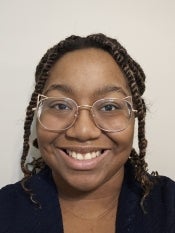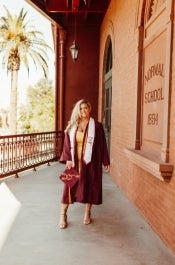Three Arizona State University students are celebrating academic achievements including acceptance into an exciting graduate program, the earning of a fellowship and the expansion of their research, thanks to the Online Undergraduate Research Scholars (OURS) program offered by The College of Liberal Arts and Sciences.
OURS is designed to give online students the research experience that is necessary for success in careers and graduate school, offering a variety of experiences across a wide range of disciplines. Also, the program aims to meet students where they’re at, serving online students not just from Arizona, but across the country and abroad.
“At ASU, we are always seeking innovative solutions to provide our online students with experiential opportunities that will help them find success beyond graduation, and the OURS program is one of these examples,” said Ara Austin, senior director of online engagement and strategic initiatives in The College and a clinical associate professor in the School of Molecular Sciences.
Enyce Fairbanks will be joining Johns Hopkins University’s Post-baccalaureate Research Education Program (PREP) this spring; Joelle Denning will begin her evolutionary biology PhD program at ASU’s School of Life Sciences, with funding from the National Science Foundation, this fall; and, also this fall, Melanie Aldridge will pursue her graduate degree in biomedical sciences at Vanderbilt University.
“We are thrilled to see that students like Enyce, Joelle and Melanie were able to participate in the OURS experiences to gain skills and the preparation needed for competitive graduate programs," Austin said.
Read on to learn more about the students’ research and journeys.
Enyce Fairbanks
When she started her collegiate career, Fairbanks attended school in person in her home state of Virginia — until the COVID-19 pandemic. Because she could no longer attend class in person, she got a job at Starbucks and began her journey as an ASU Online student in the School of Life Sciences, majoring in biological sciences with a concentration in genetics, cell and developmental biology.
Fairbanks became involved in cancer microbiome research through the OURS program after taking a class with Austin that led to a research opportunity with the Arizona Cancer Evolution Center (ACE) Scholars program. She says the OURS program challenges the narrative of online learning being “less than” the traditional college experience.
After graduating this spring, Fairbanks will be joining Johns Hopkins University’s PREP, which is funded by the NIH for underrepresented students to get additional years of research experience before applying to biomedical PhD programs. She will be continuing cancer microbiome research, and hopes to be at the forefront of “improving cancer therapeutics and making them more effective for people.”
Joelle Denning
Denning joined the OURS program when it first took off while living in Japan in the spring of 2022. Now, this spring, she is graduating with her degree in biological sciences with a concentration in genetics, cell and developmental biology, and a certificate in computational life sciences.
After her first online bioinformatics genomic research experience, Denning continued on as a TA. That experience, being a witness to the expansion of the OURS program and the unwavering support from her mentors are what drive her motivation to make scientific research attainable to students regardless of where they are. Her research plan, funded through the National Science Foundation (NSF) Graduate Research Fellowship Program, integrates online research experiences for students.
“OURS truly opened the door to opportunities, and I hope the course will inspire more online students like me to further their research journey,” she said.
Denning plans to move to Arizona to start her evolutionary biology PhD program at ASU’s School of Life Sciences.
Melanie Aldridge
Aldridge has always been interested in how medicine works. Driven by her online studies as a biochemistry student in ASU’s School of Molecular Sciences and her dedication to help others, Aldridge sought to pursue graduate school and gain the necessary research experience that would prepare her for a successful career.
Through ASU’s OURS program, she completed two internships: one in memory and attention control research, simulating neurological memory impairment studies, and another in cancer biology and evolutionary theory through the ACE Scholars Program. Through her involvement, Aldridge received five units of research credit on her transcripts, presented at five research symposiums, won a poster prize in cancer studies and is actively producing a manuscript detailing vulnerabilities in cancer communication.
Aldridge, who graduated from ASU in spring 2023, recently was accepted into half a dozen different graduate programs and has decided to attend Vanderbilt University in the fall of 2024, pursuing a graduate degree in biomedical sciences with a focus in cancer biology.
“OURS gave me opportunities that I would not have had as an online student, and I don't know what I would've done had I not had this opportunity,” Aldridge said.
David Rozul contributed to this article.
More Science and technology

ASU-led space telescope is ready to fly
The Star Planet Activity Research CubeSat, or SPARCS, a small space telescope that will monitor the flares and sunspot activity of low-mass stars, has now passed its pre-shipment review by NASA.…

ASU at the heart of the state's revitalized microelectronics industry
A stronger local economy, more reliable technology, and a future where our computers and devices do the impossible: that’s the transformation ASU is driving through its microelectronics research…

Breakthrough copper alloy achieves unprecedented high-temperature performance
A team of researchers from Arizona State University, the U.S. Army Research Laboratory, Lehigh University and Louisiana State University has developed a groundbreaking high-temperature copper alloy…





